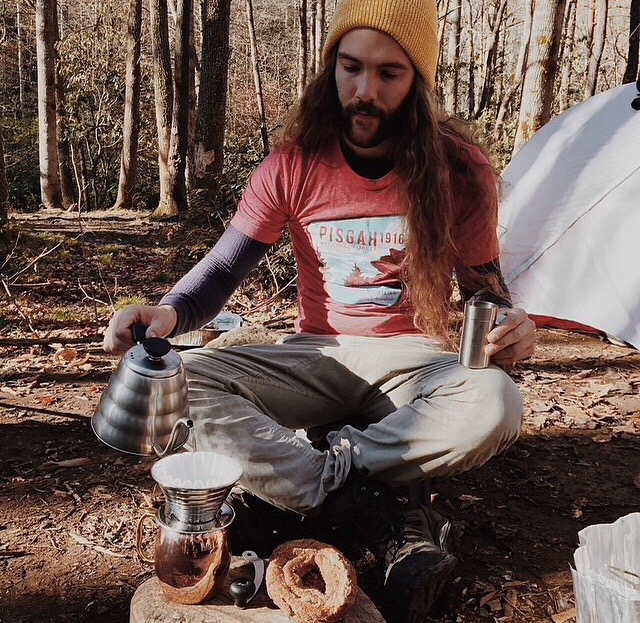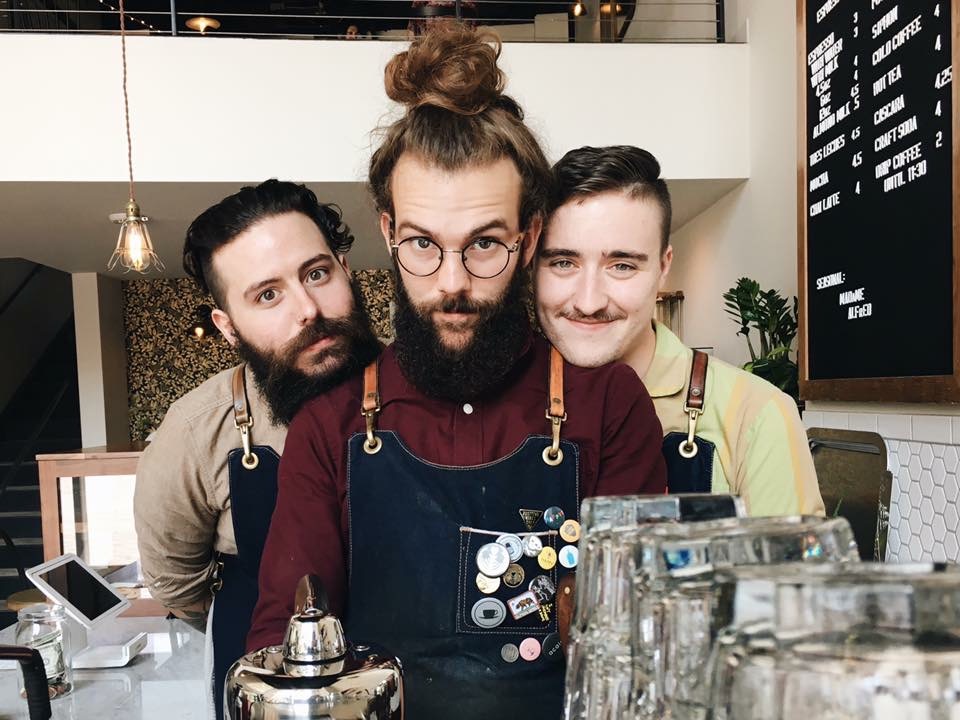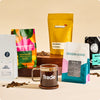We're talking to the folks behind the coffee you love to find out how they got there. How they turned their individual passions for crafting the perfect cup of coffee into small businesses sharing their coffee within their communities and beyond. The road is long, often challenging, but always well worth it — this is how they made it happen, these are their Founders' Stories.
This week, we invite you to meet Will Shurtz, one third of the friendship that helped form Greenville, South Carolina's Methodical Coffee. Part Vagabond, and now part businessman, Will takes us from his very first cup to the one that sparked the idea to make coffee a livelihood — and beyond! While his tastes have evolved over the years, enthusiasm and passion came young for Will.
A coffee lover is born
Listen: Will tells us about his first coffee
"My first experience with coffee was really just all throughout childhood. Growing up my mom, I thought at the time, I thought that my mom had taught me just the absolute best was to make coffee… We usually went with Folgers, sometimes Maxwell House, depending what was on sale. But, you got your Folgers and your Mr. Coffee pot, the night before you put it in there. And then what I would do to spruce it up, is mix it up with a little ground cinnamon and raw sugar in the coffee grind. And the next morning you would wake up to it brewing. And that was my first experience with coffee — we just used to do that all growing up.
And so I’ve always enjoyed coffee, just in different ways throughout my entire life. I still think coffee can be enjoyed that way, and it can also be enjoyed in these other ways that us here at Methodical and a lot of other awesome roasters around the country are doing — in that coffee can be something different. Fast-forward to my first coffee experience that got me into the mindset of where I am now, when I was in high school. I was working in a café, it was my dream café. I had already started to get a little bit more into coffee. I was opening the shop and we had a natural process Ethiopia Idido on the bar and before the shop opened, I made myself a Clever dripper of it, and after that it was just like over — it totally blew my mind. And that’s kind of my first two experiences with coffee right there."
The moment of breakthrough
"The reason I got into the coffee industry is because I was traveling a little bit in a band. And they were all a little bit older than me, and wanted to go out and about a little bit more, and I wanted to go with them. So, I convinced my parents to let me do high school online — I convinced my parents to let me sign up for this online school where they would send me a laptop and I would be able to log in anywhere there was Wifi. That way, I could travel with the band and then just pop into a café and do my day’s worth of high school. And because of that, I just had tons of time when I was home, because I would just finish up school in three hours or something, so I started working in cafés. My first café was a lot of fun, and I did that for about a year and a half. And when I was about halfway through 12th grade, I got this job at Coffee and Crema which was here in Greenville, started up by this guy named Shannon Hudgens.
It was so intimidating at first! I could just tell the difference though, like I would go there and coffee would taste so good, I didn’t know what it was. Eventually I was just like, 'Can I work here for free?' And they let me kind of apprentice for a couple of days and then they were like, 'OK, we’ll hire you.' I think they needed some help staffing the bar! After that, when I started working at Coffee and Crema, that’s when everything kind of started to change for me and I started to feel like I wanted to pursue coffee as a career.
Listen: Will takes his next big step in coffee
I had no idea how to do that. I wasn’t, and I still don’t think I am, very business savvy. Didn’t know about numbers or anything, I just knew I loved people, and I loved coffee, and this is what I wanted to do. And so my boss, Shannon Hudgen, the guy who started Coffee and Crema, he was talking to me and he was like, 'Hey, if you want to make coffee your career here in Greenville, South Carolina… you’re just going to have to get creative.' So, I was like, OK. I thought about how it would be nice to have a coffee shop, but I had no money or anything, so I just had my brewing equipment and I started to get the idea that I could just travel around — and this was in 2012 — and so I started this traveling coffee bar called Vagabond Barista.
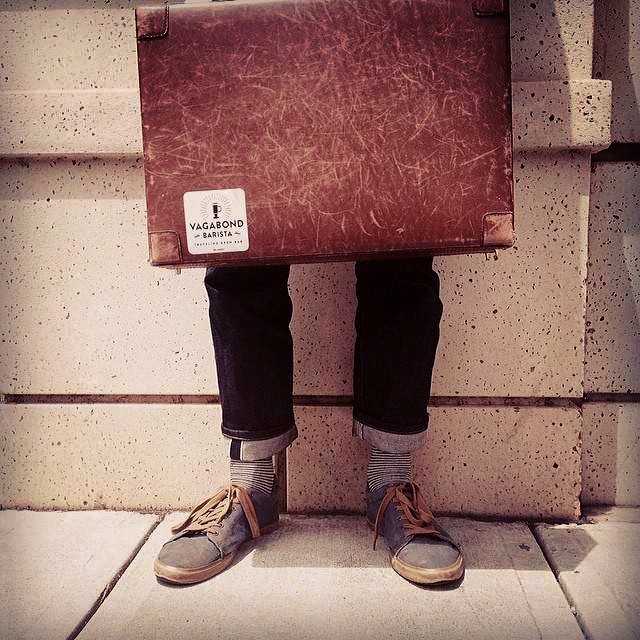
And then, and I had applied for college and everything and could have sworn I was going to university for recording engineering, and then I was just like… “I don’t want to do this, I just want to do my coffee thing.” I started Vagabond Barista and the guy who did all my branding and design for Vagabond, his name is Marco, and we became great friends and he’s just a fantastic designer. And he is my business partner, one of two of my business partners now at Methodical. And one day, Marco texted me (or maybe he called me) and he was just like, 'Hey, would you want to start up a coffee shop together?' He was living in Atlanta at the time, and in my mind, I had been doing Vagabond Barista for a couple of years now, and that was fun, we would just travel around and set up coffee bars at events all over, we went out to Las Vegas, we took a road trip up to New York and all that, it was so fun. We would just set up anywhere — universities, weddings, business meetings. And I was getting a little tired of doing it all on my own, my friends would help me, but all in all the company was kind of just on me.
And here I am, I didn’t know anything except for coffee and loving people. But, he texted me like 'Want to start a coffee shop?' And I thought that sounded awesome, because I was like, I would not be able to do this on my own. I wouldn’t want to do it on my own. And I think the whole point of coffee is like a really huge part of it is community, and it sounded great. So I said, 'We need to bring my friend David on board,' who I met earlier also, and we had become good friends. He was a business operations guy, he was running hotels and hostels in Prague before he moved back to Greenville. And so all three of us teamed up: we have Marco in marketing and design, and he wanted to get into a little bit more tangible stuff and design cafés and whatnot, and then you have David the business operations, and then I had the coffee experience."
Teamwork makes the dream work
"So we teamed up and we’re just best friends and it’s been fantastic. we’re just about five and a half years in now and man, I haven’t even gotten to the roasting part yet! But that is how Methodical got started. We had the same vision and we were able to form like a family, finally. And I wasn’t just doing something on my own and that felt really nice.
But then, even better, we were able to start for other people in our community who also wanted to have that career in coffee. That is still a pursuit that we’re after. I’ve always just wanted people to be able to make a good living working in the coffee industry here in Greenville.
Listen: Will explains what community means to him
The community has been incredibly responsive, and we’re offering a different kind of café experience in Greenville than a lot of people were used to. But, people were just so open and accepting and they really flocked to us and really accepted us in a way that I thought would take a lot longer to happen. Not that I wanted us to be separate or to be something that people were unfamiliar with, I didn't necessarily want that. But I think the nature of a coffee bar, it kind of looks fancy and it has these coffees with funny names and odd flavor profiles and all this stuff. We really love it, but I didn’t know that it would take on so quickly. People really accepted us. And I think that it’s the support of our community, fanning our flame, our desire to grow and to do what we want, that allows us to have success anywhere outside of the lines of Greenville, South Carolina. If we were here doing what we’re doing, and trying to do the best we can, but weren’t supported by our community, then I really don’t think it’d be worth it to do anything else. I think first we have to have a good relationship with our community and serve them the best we can and have the best relationship with them that we can, before we start to try to reach out.
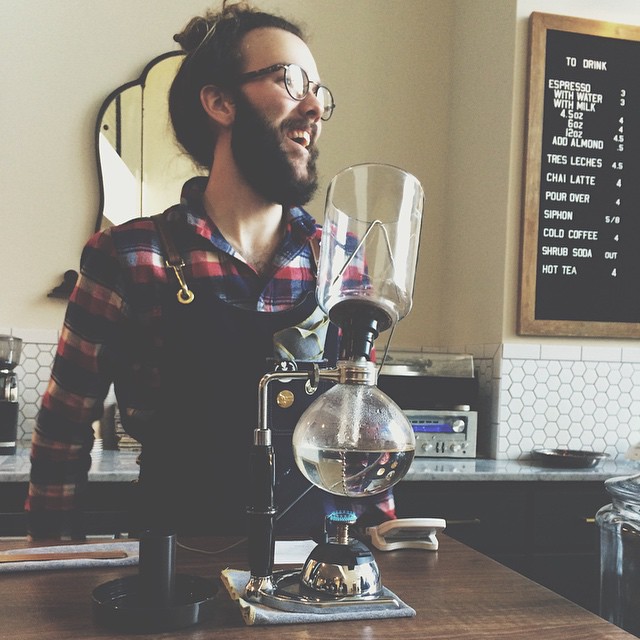
There’s a lot of stories I can tell you, from finding our location, to local events that people could have chosen a non-local coffee company to do — all these things add up to really build us up and help us along our way, so we can be almost a safe haven and a spot for people to benefit from."
Roasting: the final frontier
"So, it was pretty soon after we started our first café that we decided to start roasting coffee. I didn’t ever actually have a vision for roasting coffee, I was a barista since high school and I loved it, and I just loved that person-to-person interaction and the energy of a busy café. We knew we wanted to do more cafés, but a year into it the first café was running pretty smooth and it was looking pretty good. So, we were like, “What’s next?” That’s when we decided to start roasting coffee. David, specifically, he had fallen in love with the coffee industry though a roasting company in Prague — he was friends with the owner of a café and roastery. And he was like, 'What if we just started roasting coffee?' It just kind of made sense, then I got excited about it, because another step in the coffee industry — something new to learn.
The only thing I was nervous about was, am I still going to be able to interact with people in the same way that I can as a barista and serve people in that way? And so I was a little bit nervous about that. We started and got tons of help from companies around the country just lending free advice, it was just so amazing. We wouldn’t have been able to do anything without these people. And we started roasting. Then I realized that I’m just over the moon about it, because not only are we able to take the experience that we want to give people in our cafés, we’re able to like even do even more so than I thought. So, now here I am interacting with people more than I would be otherwise and having just all these fun relationships everywhere. So we were able to stay in touch with people and we didn’t lose any of that customer service and personal interaction that I thought we would. And on top of that, we’re able to provide more career paths and grow the company, which helps everybody, and it’s just a ton of fun.
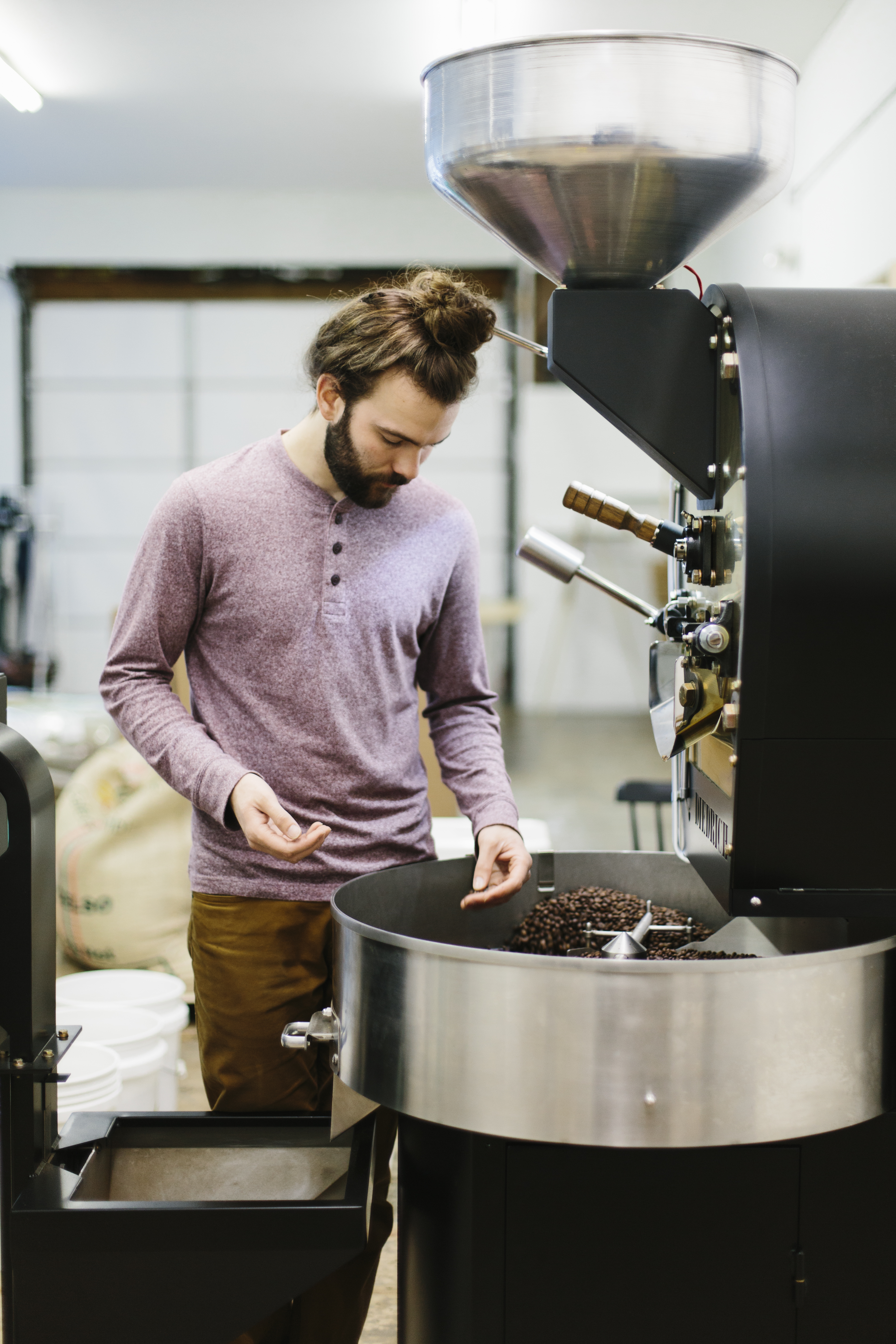
I still feel like at about four years in, I’m just now somewhat starting to grasp what is going on. When we started roasting I had touched a roaster maybe one time. And all I knew was what good coffee tastes like. I didn’t know how to find it, or make it, or anything. And so, we reached out to a lot of roasters around the country that we really looked up to. And, we started out just saying, 'What machine do you use?' And the consensus was you really can’t make a bad decision — especially if you’ve never roasted before. So, we chose a Diedrich and we got our machine and I went up to Nashville. I spent some time with Sean Stewart up there and he showed me so much. We started out just mimicking what we had learned before we kind of started to find our own voice.
And it was a huge learning curve, and it still is, all that goes into it with the fun stuff like finding the coffees, profiling them to bringing the most flavor out, to getting accounts that we can share our coffee with around the country and the world. And then the not-so-fun stuff that is really necessary, learning cash flow and how to operate the production facility as efficiently as we can. So all these things were a total learning curve, and we’re learning as we go with an incredible amount of help from the industry around us. And it encourages me too, I want us to be those people that will freely give advice and help to people that are just looking to do something good, you know?"
Paying it forward for the next generation
"I think if someone is in the position of just being in the coffee industry and wanting to grow, the main thing that I’ve seen is that people will want to be in the industry and it’s a really slow-moving process most of the time. There aren't any accredited (not to my knowledge) schools where you can just go for a coffee degree. So everything moves a little bit slower and mainly what I see is people wanting to get into the industry and then it’s almost like they lose their desire or maybe they get distracted by another opportunity and they get out. And so they just don’t stay in it long enough to see the result that they want to see. I tell a lot of people around here, when we’re just chatting about it, if you stick it out long enough, and can make it work while you’re sticking it out to stay in the industry and grow in the industry, then chances are it's going to happen. Opportunities are going to come up or you can create something yourself, it just takes a lot of patience.
To someone who’s in the industry and wants to grow further into it, I think everything stops when somebody gets to a point where they feel like they are kind of 'it', and they’re doing it and they’re the best, or they’ve made the best moves, and are kind of top of their game. They start to get a little bit of a big head. I think that’s when people start to fail.
And so I think it’s important to know that we’re just all here trying to do the best we can together — keep a mentality of wanting to learn and wanting to grow, and foster the things that are falling into your life. Staying humble, staying in it, staying patient, those are the really huge things as far as getting where you want to go in the coffee industry.
Listen: Will's best advice to his younger self
If I were to give advice to young Will, the first thing I might say is it is so easy to jump into your passion. And honestly this kind of sounds a little bit boring, but it’s the first thing I thought of and I think it has value: it’s really easy to jump into what you want to do and just to go at it with everything you have. But, I would tell younger Will to try not to ignore all of the smaller details of getting to where you want to be, that make it possible.
So, you know the book work and the organization of your bills and your taxes, and all of that stuff helps you to build up to do the fun stuff that you want to keep doing the rest of your life. And so, I would just say, don’t just focus on the fun stuff, because if you do, that will kind of eventually simmer down, but fan the flame in every category of your passion — even the stuff that isn’t so fun. And you’ll just keep on building!"







